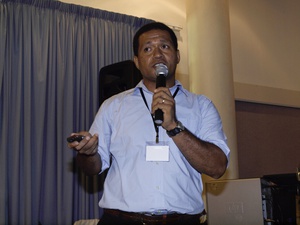 Delegates at the three-day Deep Sea Mineral Mining “high level” workshop have identified key issues that need to be addressed towards the commercialization of deep seabed mining in the Pacific Region. The workshop was held from June 6-8 in Fiji.
Delegates at the three-day Deep Sea Mineral Mining “high level” workshop have identified key issues that need to be addressed towards the commercialization of deep seabed mining in the Pacific Region. The workshop was held from June 6-8 in Fiji.
The workshop, organised by SPC/SOPAC, and funded by the EU, focused on legislative, regulatory, capacity requirements, and the environment, all pertaining to deep sea minerals and mining, in its roster of issues.
It is part of a four-year EU-funded project, headed by Deep Sea Minerals Project Leader, Akuila Tawake that will develop the legislative and technical framework to help countries in the region implement laws to regulate seabed mining.
Deep sea mining has become a major topic in the region with the announcement that Nautilus Minerals is expected by the end of 2013 to begin the mining of the Seafloor Massive Sulphide system in 1500 metres of water off the coast of New Ireland in Papua New Guinea - the first deep sea mineral mine in the world.
The importance of the mine development was reflected in the workshop discussions, where world-leading specialists on issues pertaining to deep sea minerals made presentations that highlighted the many aspects related to mining the seabed, including environmental and conservation, legal and regulatory, fiscal, and technologies.
The specialists included: Michael Lodge, Legal Advisor for the International Seabed Authority; Dr James Hein of the US Geological Survey (USGS); Dr Linwood Pendleton, Director of Economic Research, Duke University, USA; Dr Yannick Beaudoin, Head of the Marine Programme at UNEP/Grid-Arendal; Daniel Dumas, Head of the Commonwealth Secretariat Economic and Legal Section; Graeme Hancock, formerly of the World Bank; Dr Sven Peterson, a mineralogist at the Leibniz Institute of Marine Studies; Professor Chuck Fisher, a biologist at the Pennsylvania State University in the United States, and Dr Samantha Smith, Environmental and Community Manager for Nautilus Minerals.
They lent their expertise to the more than 100 delegates from around the region, many of whom had little knowledge about the mineral resources that are located in the seabed in many of their Pacific Island countries.
In opening the workshop, SPC/SOPAC Division’s Director, Dr. Russell Howorth reminded the delegates that the specific purpose of the workshop was “to strengthen the system of governance and the capacity of Pacific ACP states in the sustainable management of their potential deep-sea mineral resources.”
He encouraged delegates that the correct way forward in the workshop was strategic, built on inclusiveness and interactive dialogue, which would then lead to incremental actions.
“In these ways,” he added, “sustainable use of deep sea minerals can proceed for the benefit of all within known levels of acceptable risk.”
Towards the conclusion of the workshop, delegates were asked to define the issues challenging seabed mining. Once they return to their home countries, delegates are being asked to review and amend the meeting outcome’s results, which will be used as a resource material in the development of the regional legal and technical framework.
As part of the Project a further two-day Steering Committee Meeting will be held from June 9 and 10 at the same venue where participants will commence to make an assessment of Pacific marine minerals and deep sea mining, based on past scientific studies.
Many of the specialists will be a part of the Steering Committee meeting.
“This meeting is part of the SPC/SOPAC Division and the Norway based UNEP/GRID-Arendal, (the United Nations Environment Programme information office) partnership,” said Akuila Tawake, Deep Sea Minerals Project Team Leader. “It is expected that the outcomes from this assessment will take one year to complete.”
Countries that are participating in the Project are the Cook Islands, Federated States of Micronesia, Fiji, Kiribati, Marshall Islands, Nauru, Niue, Palau, Papua New Guinea, Samoa, Solomon Islands, Timor Leste, Tonga, Tuvalu and Vanuatu.


Captions
i. Delegates listen to the presentation in the conference hall
ii. Akuila Tuwake, Deep Sea Mineral Project Leader speaking at the workshop.
iii. Dr. Russell Howorth (l) speaks to Charles Roche. Executive Director of the Mineral Policy Institute Australia during the Deep Sea Mineral Mining workshop





